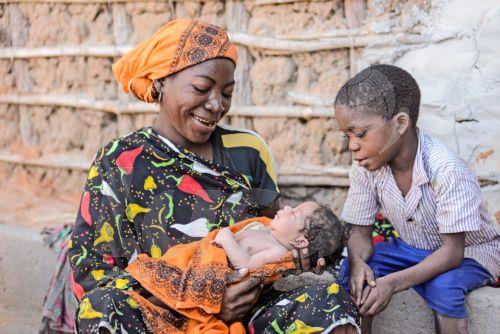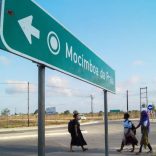Mozambique: Two killed by stray bullets in Matola shooting targeting alleged SERNIC agent who ...
Mozambique: She ran into the woods from the killers before giving birth

Photo: Antonio Silva / Lusa
Muanassa Saide spent the last weeks of her pregnancy on the run after escaping an attack on her village where her brother and an uncle were killed.
She ran away in the middle of the night with her mother and sister-in-law taking her three children and leaving her father to guard what they had left behind.
She ran dozens of kilometres through the Lalane woods to Olumbe and then caught a lift to Palma, the district seat on the border with Tanzania, where Saide Issa, the baby she had carried in her belly as she ran for her life, was born seven days ago.
They now all share the plate of Muanassa’s unemployed sister, the hostess in a land where there is never much to eat.
The children didn’t go to school and now formal education is even further over the horizon.
Stories of displaced people who ran away with nothing are repeated time and again in the rickety houses beside the beach in down town Palma, where every home shelters relatives among the palm trees, sun and feet that have been calloused by the streets of dusty earth.
There wasn’t much fresh cassava to begin with and now there is even less as the locals are afraid to go into the fields and so they try to make do with dry cassava and ‘xima’ – a corn flour porridge or whatever comes to hand, Momade Issa, who lives in the village of Monjane, said.
The festivity at the end of Ramadan has a bitter taste to it with the fasting being broken in some cases with little more than some left-over flour and a bit of water, they say.
They hear the calls to prayer from the mosques, there are children playing and the adults speak various different languages: Mwani, Macua or Swahili. Portuguese is not common and when it is used it can be treacherous with words being used for anything except what they really mean.
Muidine Najumo fled Monjane with his family after the 27 May attack when 10 people were killed there and in Nangamede, the bloodiest day in the recent wave of violence against remote settlements in the north of Mozambique.
He is preparing to return, but he is going to leave his wife and children with his brother, Sumail Najumo, a widowed carpenter who doesn’t like to live alone, but who now recognises that he does not have enough food for so many mouths.
The days go by slowly, the hours drag by in conversations that go back and forth across the street from doorway to doorway.
That is what it is like today, but ever since the last Sunday in May there has been a bustle of displaced people heading towards the different district seats in Cabo Delgado province.
Momade Issa walked for three hours from Monjane to Palma with his wife and children aged from three to 20, carrying everything they could.
“It was very hard”, he said, on his way back to the village, where everyone is still afraid when the sun goes down, which happens at about 5 in the afternoon at this time of year, a fear that is only tempered by a nearby group of soldiers.
The manager of a building company remembers seeing an unusual crowd with belongings on their heads in Macomia, another district seat just days after the villages of Naunde and Namaluco, which are also in the middle of the woods were razed to the ground on 4 and 6 June.
It was still on fire and people were fleeing to the archipelago of Quirimbas, where local authorities made lists of the displaced so as to distribute half a tonne of rice, 800 kg of beans, soap and mosquito nets that had been donated by the district government, a company and private institutions.
Cato Braime is happy because suddenly he has 34 friends and relatives in his house on the Island of Ibo, who had fled from Naunde.
The improvised space among the clay blocks, earth and a tent in the yard looks small, but he says “there is no problem. They lost the house and the fields” that fed them Cato said, and no-one can imagine anything worse than that – “it’s war”.
About 1,100 people have fled to the island of Ibo, all to the homes of relatives and acquaintances, said Rafael Gonzales (35) the coordinator of the Ibo foundation, an organisation that monitors the aid distribution.
There were heads of households that suddenly had to try and feed 35 people in their homes and yards in a show of “tremendous solidarity” among Muslim communities.
The neighbouring island of Matemo took in almost 700 people.
The displaced villagers fled their homes with nothing. They left without clothes, particularly women and children, while their menfolk stayed behind to care for their livestock and other belongings”, said Rafael, portraying those who had had a close encounter with violence.
Little by little, the movement is now in the other direction.
Chica Ansumane Ali does not know how old she is, but she is the “grandmother”, the oldest one in Cato’s house, and she says she is not afraid to return to Naunde.
The men are there, they’ll protect her. After all, it is only the women and children who are still away, she says, and it is time to go back to the fields and rebuild the house they burnt down on the night that brings back such bad memories.
“When they arrived, the demanded stuff, money, any kind of silver and when I said I had none they got angry. They ordered the children and me out of the house and set it on fire”, Anita Ibraime (30) said.
Ingamo Jussa (29), with a baby on her knee, said the same thing “they demanded, but I had nothing to give” and now I don’t even have a home.
I want to go back without being afraid, sure that the men are there.
Muanassa says otherwise, she says she prefers to rock the newly-born beside a fire in Palma because she gets goose-bumps when they ask if she is thinking of going back to her village, Lalane – north of Naunde.
Her uncle was shot in the house, her brother was chopped to bits when he was watching a film in the yard and nobody knows why, or who by.
It was a moonlit night in that peaceful place and for Muanassa the memories of the unknown assailants with the machetes and machine guns are still too fresh.












Leave a Reply
Be the First to Comment!
You must be logged in to post a comment.
You must be logged in to post a comment.